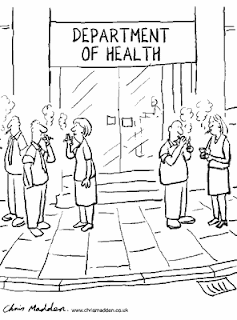Naturally, public health encourages individuals to stop smoking. CDC's website offers how to quit, the benefits of quitting, etc. But there are several big-picture strategies that public health has employed to encourage the population to stop smoking.
- Smoking cessation education campaigns - This method includes public service announcements, ad campaigns, etc. Smoke-Free Illinois has this ad campaign. Tobacco Free California has some great materials and website, including clever e-cards that you can send smoker friends. And check out this video from Iowa's Just Eliminate Lies video that works to eliminate tobacco companies' effects on youth.
- Smoking bans - Many states have enacted smoking bans to restrict smoking in public places. According to the American Lung Association, 26 states and D.C. have enacted laws banning smoking to some degree. And these bans seem to work; air pollution in restaurants and bars have decreased, and some areas have reported decreased heart attacks and other health effects, although these findings are somewhat debatable. A recent IOM report states that "smoking bans can have a substantial impact on public health."


- Scare tactics - Ah, the scare tactic. Yes, this fits in with #1, but it is a particular type of ad campaign. This type is sometimes employed by public health departments and other times by private non-profit organizations. The Truth campaign is probably the most well-known of these campaigns. However, this tactic may not work. A recent article stated that this public shaming technique may not be effective: "People are made to feel really, really bad about their smoking and are treated quite badly, but feel quite helpless in quitting," said Kirsten Bell, a medical anthropologist.
- Cigarette taxes - Taxes, the American way, right? Well, it's true in the case of cigarette taxes. Taxes on cigarettes range from $0.07 (South Carolina) to $3.46 (Rhode Island). And according to the Campaign for Tobacco Free Kids, these taxes work: For every 10 percent increase in the price of cigarettes, youth smoking decreases by 7 percent and overall smoking decreases by 4 percent. Click here for related scientific studies. And the federal tax increased in 2009 from $0.39 per pack to $1.01 per pack.




No comments:
Post a Comment